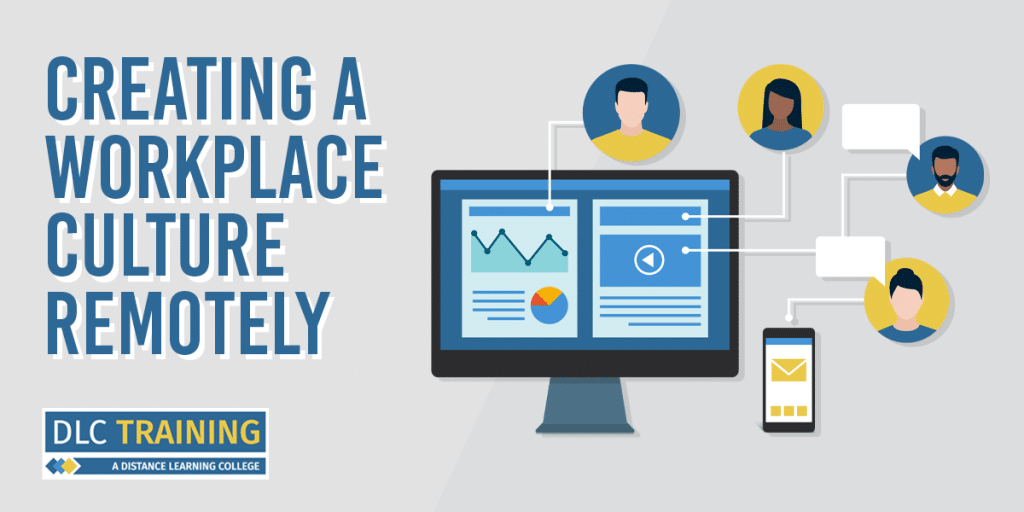Remote working allows employers to save time and money in some aspects of running a business but it can mean that they have to put extra effort into creating a positive culture virtually and ensuring employees from different backgrounds and locations feel included, involved and happy at work.
To help make this easier, our leadership experts here at DLC Training have broken it down into tangible tips you can implement for your remote team to build a positive culture remotely.

What is organisational culture?
The culture at an organisation is the personality of the business, the values, character and behavioural aspects of its team. It’s also the expectations placed on employees in how to conduct themselves as part of the team. These expectations typically aren’t written in a rule book but implied via the day-to-day actions of the leadership and management team. It can be difficult to define but, ultimately, workplace culture is the way the business makes its employees feel.
Why is workplace culture important?
Whichever industry you work in, a happy team will retain talent, attract talent and can even be more productive. Getting workplace culture right is important because it sets the tone for the way your business works which impacts everything it does including the relationships formed with stakeholders, customers and prospective employees. This is even more important for remote employees because it’s the culture that will fill the voids that may appear from the lack of onsite socialising or in-person meetings, placing much more emphasis on how they feel and experience the workplace personally.
Top tips for creating a culture if your employees are remote
So, how can you create a positive workplace culture if you work remotely?
Promote Collaboration Wherever Possible
A remote team is still a team, this means tapping into each other’s strengths and supporting each other through the struggles. Encouraging teams to work together, even virtually, is imperative to creating a positive culture, one where employees feel they can rely on those around them, ask questions and have a safe learning space to be built up by those whom they work with. This could be as simple as creating work pairs or providing ‘buddies’ when someone first joins the team to ensure they know they have someone they can lean on when they need to.
Encourage Video Chat Over Telephone Calls
It can be tempting for employees to switch off their cameras for remote meetings or even just call other team members on the telephone for quick questions. To create a positive culture, encouraging your team to make use of video conferencing will offer remote members the face-to-face time they miss out on to help humanise their interactions with other employees.
Cheer Your Team On
Still take time to celebrate the wins of the team, whether this is an email, a quick video call or a Slack message, taking time to acknowledge the good helps build the team up and spurs the whole team to positively reinforce each other – the perfect foundations for a positive work culture.
Prioritise Professional Development
It’s important employees feel understood for a positive culture. By prioritising professional development, you’ll show your staff that their future and growth are important to the business which will help retain talent. This can be done by listening to their training needs, investing in leadership and management courses to help them move up the career ladder or by creating personal development plans with them to offer guidance and support on their next steps. A workforce that feels their future is well looked after is less likely to look elsewhere for a job and will invest in a workplace that chooses to invest in them.
Build Relationships
Make time, albeit virtually, for those day-to-day conversations that build working relationships outside of the job. Simply taking an interest in colleagues, asking about their lives, and learning about their home life and their hobbies can help build relationships that can help bridge the gap for remote workers and create the right culture.
Discover how DLC Training can help with employee retention through professional development, a great way to create a positive workplace culture that is flexible around employees.